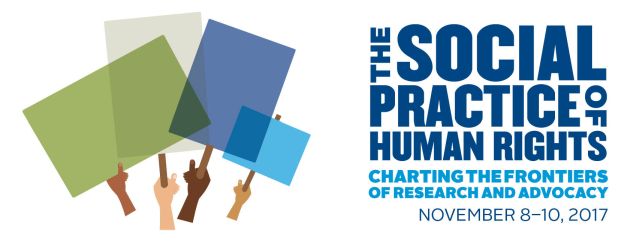
Start Date
11-8-2017 3:30 PM
Keywords
Joy, Activism, Self-Expression, Clowning, Oscar Romero
Abstract
In popular, legal, and academic discourse, a subtle but significant shift has occurred: The term “human rights” is now almost always discussed in relation to its opposite, “human rights abuses.” Syllabi, textbooks, and academic articles focus largely on abuses, victimization, and trauma with nary a mention of joy or other positive emotions.
This will be obvious to most human rights scholars and practitioners once it is pointed out, but the depth of the elision is staggering. Human rights could also be discussed in the context of the most joyful of human experiences and even those victimized almost always experience the panoply of human emotions including happiness and joy.
In this paper, drawn from my forthcoming book Joyful Human Rights (University of Pennsylvania Press, 2017), I explore how many activists around the globe are claiming their rights in a new, festive, way. I argue that joyful rights claiming can be self-expressive and self-fulfilling while disrupting hegemonic discourses.
I begin with more traditional formations of joy in social movements through a brief analysis of carnival in the seminal work of Mikhail Bakhtin, recent research on playful social movements, and Victor and Edith Turner’s concept of communitas. I then explore how erotics infuse the varied works of queer resistance performance artist Jesusa Rodriguez in her mass cabarets and other performances and protests. The following section looks at clowning as a form of social protest and shows how clowns have refined their resistance techniques from the early modern jesters to contemporary hospital clowns and the remarkable NGO “Clowns without Borders.”
The paper concludes with a discussion of Archbishop Oscar Romero, who found great joy and renewed faith the last three years of his life when he opened his heart to fight with the poor in El Salvador.
Joyful Human Rights Activism
In popular, legal, and academic discourse, a subtle but significant shift has occurred: The term “human rights” is now almost always discussed in relation to its opposite, “human rights abuses.” Syllabi, textbooks, and academic articles focus largely on abuses, victimization, and trauma with nary a mention of joy or other positive emotions.
This will be obvious to most human rights scholars and practitioners once it is pointed out, but the depth of the elision is staggering. Human rights could also be discussed in the context of the most joyful of human experiences and even those victimized almost always experience the panoply of human emotions including happiness and joy.
In this paper, drawn from my forthcoming book Joyful Human Rights (University of Pennsylvania Press, 2017), I explore how many activists around the globe are claiming their rights in a new, festive, way. I argue that joyful rights claiming can be self-expressive and self-fulfilling while disrupting hegemonic discourses.
I begin with more traditional formations of joy in social movements through a brief analysis of carnival in the seminal work of Mikhail Bakhtin, recent research on playful social movements, and Victor and Edith Turner’s concept of communitas. I then explore how erotics infuse the varied works of queer resistance performance artist Jesusa Rodriguez in her mass cabarets and other performances and protests. The following section looks at clowning as a form of social protest and shows how clowns have refined their resistance techniques from the early modern jesters to contemporary hospital clowns and the remarkable NGO “Clowns without Borders.”
The paper concludes with a discussion of Archbishop Oscar Romero, who found great joy and renewed faith the last three years of his life when he opened his heart to fight with the poor in El Salvador.


